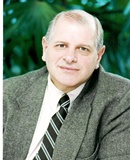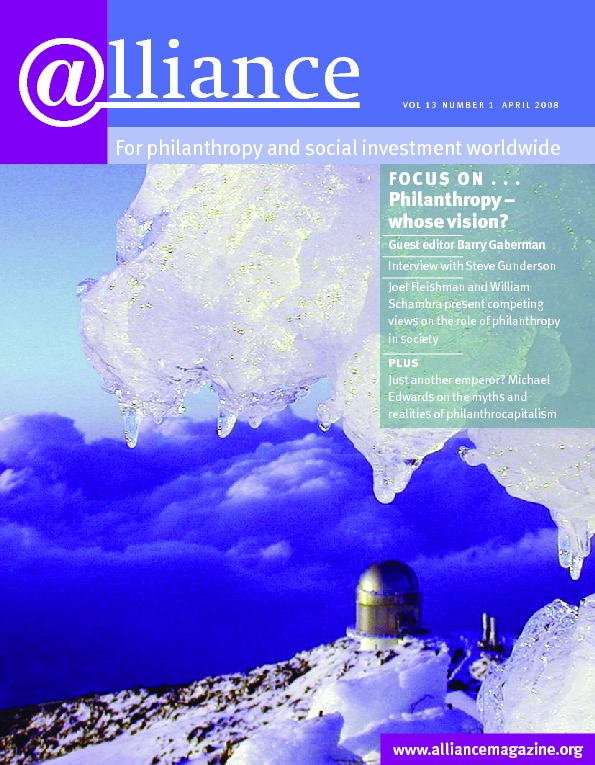Two Alliance editorial board members, Atallah Kuttab and Marcos Kisil, had issues they wanted to raise with Steve Gunderson, following his interview for Alliance.
Atallah Kuttab
9/11 has brought US Government regulations to curb giving to third world countries and much intimidation on the giving scene in the Arab region, all in the name of the ‘war on terrorism’. What is the Council on Foundations doing to change those regulations, to give some confidence to outsiders that foundations in the US are not indifferent to the situation?
Steve Gunderson
The Council has taken the lead in coordinating a Treasury Guidelines Working Group, a coalition of US foundations, operational charities, legal experts, businesses and religious organizations, to educate the Treasury Department about the importance of US charitable activities overseas and to advocate for more reasonable and realistic anti-terrorism policies. This Group succeeded in persuading the Treasury Department to revise substantially the original Anti-Terrorist Financing Guidelines, issued in 2002. Despite the changes, we’re still not happy with the Guidelines and the Working Group has called for their withdrawal. The Council is also working to allow charitable funds that have been frozen due to US Government legal action to be unfrozen and reallocated to another charity. Obviously, we don’t want to see any charitable funds used to support terrorism, but at the same time we must make sure that legitimate charitable activity is not curtailed or discouraged.
 Marcos Kisil
Marcos KisilWe are seeing the progressive withdrawal of major US foundations from Latin America alongside a growing involvement of European foundations in the region. I believe the region requires both. Could the Council on Foundations address this issue in a substantive way with Latin American philanthropic leaders and major donors in the US?
Steve Gunderson
The Council is partnering with Hispanics in Philanthropy on the Philanthropic Initiative for the Americas. The aim is to grow philanthropy’s role in promoting greater economic and social justice in the Americas. We will work with existing and emerging philanthropic organizations in Latin America as well as Latino and Hispanic organizations in the US to strengthen philanthropic leadership and capacity, to share research and useful information, and to increase philanthropic collaboration across borders. We are currently developing a Spanish version of the Council’s website, a series of study tours, and potential collaborations with corporate and community foundations.
Marcos Kisil
For a conference that wants to be a SUMMIT, the preliminary programme shows much greater participation from the North than from the South. How does the Council plan to address this?
Atallah Kuttab
The interview refers to coordination with Community Foundations of Canada and the European Foundation Centre, but what about bringing in perspectives from other regions? (I know there has been consultation but the interview does not do justice to that, and might signal yet again North-North dialogue with no consideration of other regions.)
Steve Gunderson
The Council is seeking the active participation of colleagues from around the globe. A 30-member advisory committee, including philanthropic leaders from every region of the world, was created last year to ensure that a wide range of ideas and perspectives would be part of the Summit planning process. As a result, we received strong session proposals from outside the US, many of which have been accepted. We’re also working hard to incorporate non-US perspectives in the majority of sessions, even those that initially have a US focus. Our intention is that including a wide range of international perspectives will make the Summit a much richer experience for everyone. Confirmed speakers include Wangari Maathai (Nobel Peace Prize winner and founder of the Greenbelt Movement in Kenya), Mary Robinson (former President of Ireland and former head of the UN Human Rights Commission) and Azar Nafisi (author of Reading Lolita in Tehran, who will speak on women and Islam). The Summit will be the most international conference that the Council has ever hosted, with voices from Asia, Africa and Latin America as well as North America and Europe.
Atallah Kuttab is founder of the Arab Foundations Forum. Email kuttaba@awelfare.org.jo
Marcos Kisil is President of the Institute for the Development of Social Investment, Brazil. Email mkisil@idis.org.br





Comments (0)